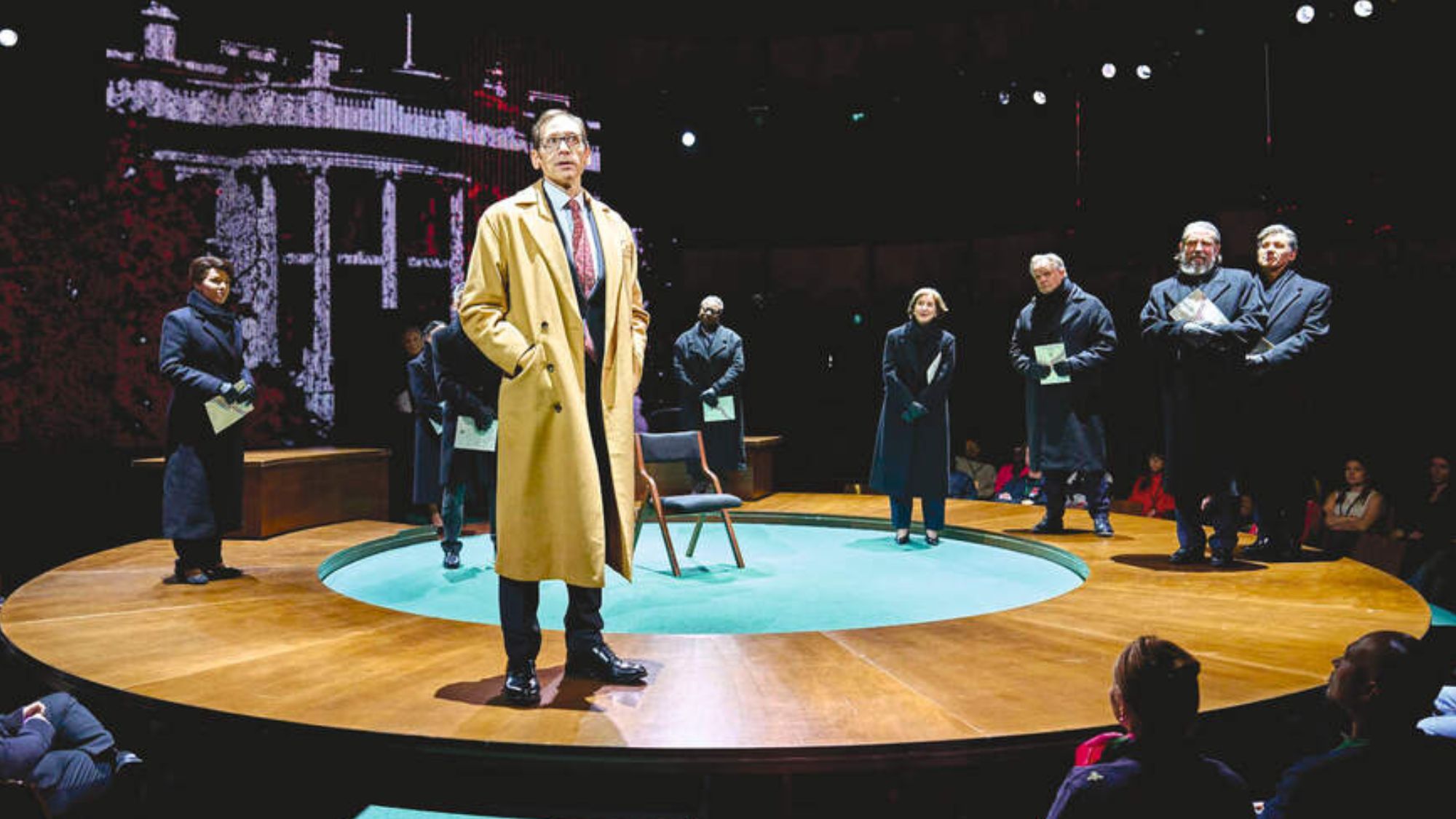Throwing soup at van Gogh's 'Sunflowers': A clever protest, or did the stunt overshadow the point?
The sharpest opinions on the debate from around the web


A free daily email with the biggest news stories of the day – and the best features from TheWeek.com
You are now subscribed
Your newsletter sign-up was successful
It was the splash heard 'round the world — last week, activists from climate group Just Stop Oil hurled a bevy of tomato soup onto Vincent van Gogh's "Sunflowers," an iconic, 13-decades-old painting worth more than $80 million. The pair of protesters responsible for the head-scratching stunt then glued themselves to the wall, shouting, "What is worth more, art or life? Is it worth more than food? Worth more than justice? Are you more concerned about the protection of a painting or the protection of a planet and people?" They continued: "The cost-of-living crisis is part of the cost-of-oil crisis. Fuel is unaffordable to millions of cold, hungry families. They can't even afford to heat a tin of soup." See the connection now?
Just Stop Oil is "demanding that the U.K. government halts all new oil and gas projects," it said in a press release, and opted to target "Sunflowers" only because it's "an iconic painting, by an iconic painter," and an attack on it would draw attention, a group spokesperson told The New York Times. The protesters were later arrested, and the National Gallery of London said the painting was unharmed save for a bit of damage to the frame. Still, the headline-grabbing incident begs the question: Was this a worthwhile, or damaging, form of protest? And will it even make a difference?
It safely got your attention — so what's really the harm?
Just Stop Oil activists later confirmed they never would've gone through with their soup-slinging plan had the 134-year-old painting not been protected behind glass. So if nothing and no one was hurt … was there really any harm in their performance?
The Week
Escape your echo chamber. Get the facts behind the news, plus analysis from multiple perspectives.

Sign up for The Week's Free Newsletters
From our morning news briefing to a weekly Good News Newsletter, get the best of The Week delivered directly to your inbox.
From our morning news briefing to a weekly Good News Newsletter, get the best of The Week delivered directly to your inbox.
"Safe, creative activism needs all the support it can get after the protest crackdown in the [U.K.] government's Public Order Bill," writes The New Statesman's India Bourke. "This particular protest has of course caused some minor cost and disruption to the gallery, but the shock factor is what makes a good stunt. I imagine the National Gallery will more than recoup in free publicity the cost of the frame repair." What's more, Bourke notes, van Gogh himself, who famously understood the connection between art and the struggles of everyday life, would have probably loved it. "Those who complain that the Just Stop Oil protesters are immature, misguided, or simply too cryptic, need to think about the bigger picture," Bourke continues. "Safe protests such as this alert us to the urgency of our ever-worsening climate crisis, and the complacency and complicity of our government. So let them throw soup."
To some extent, Mother Jones' Jacob Rosenberg agrees: "[A]s far as protests go, this one could be considered ordinary, even staid," he writes. "Young people enraged about the climate crisis sought to garner media attention to fight it." Even Just Stop Oil's basic demand — that the government commits to ending new fossil fuel contracts in the U.K. — is "rather basic" when taken among "the grand scheme of protests for climate action." (Rosenberg also argues that if some tomato soup got your goat, well, "get used to it. The world is getting hotter; the kids are getting angrier. Protests will erupt that seem cringe, annoying, and dumb. If this small episode bothers you excessively, you may need to buckle up. It will be a rough ride when it's time to blow up a pipeline.")
Ultimately, the stunt was "successful in raising global awareness for a local campaign against fossil fuels," adds Joe McCarthy for Global Citizen. "And if you look a little deeper, you can see that it was a well-planned critique of the status quo." The fine art world "represents the excesses of a global economy that's fueling the climate crisis," he continues, and "Sunflowers," with its name recognition and accessibility, proved a "smart way to get a message out there." If you felt compelled, at least initially, to "discredit the protest as misguided," imagine those involved as "throwing cold water on a person sleepwalking off a cliff," McCarthy suggests. "Startled awake, the person might, at first, be angry at the intrusion. But take a second to gather yourself, and notice the closeness of the edge."
Soup won't save us
Just Stop Oil got our attention — but its theatrics are unlikely to pay off, especially not in the current context of rising costs and energy prices, Eric Levitz argues for The Intelligencer. "The public's tendency to prioritize issues that immediately and clearly impinge on their personal finances over ecological sustainability can't be attributed solely to conservative propaganda, misinformation, or lack of awareness," Levitz posits. "For working-class families on tight budgets, an increase in the cost of gas or electricity" — a result of minimizing fossil fuel dependency — "has immediate consequences for how they live their lives."
A free daily email with the biggest news stories of the day – and the best features from TheWeek.com
So though Just Stop Oil did commendably tie the fossil fuel crisis to voters' wallets ("the cost-of-living crisis is part of the cost-of-oil crisis"), the group will be hard-pressed to find anyone willing to endure short-term pain for a long-term benefit they might not even be alive to enjoy; and surveys and polling back that up. In other words, the solution these activists seek is not one that "works at the speed of politics, which, in democratic countries, operates on short time horizons."
"In sum: You are not going to make the typical voter in Britain or the U.S. more acutely aware of climate change than they are of their household energy bills," Levitz writes. And "in the absence of other policies," restricting fossil fuel extraction "risks increasing those energy bills, thereby creating political opportunities for the least climate-conscious parties and actors in Western societies." So what we actually need, more than soup and more than stunts intended to just "raise awareness," are "climate-conscious young people to dedicate themselves to tackling the technological barriers to decarbonization and formulating industrial policies that erode the political ones."
The mess overshadowed the point
Yes, the planet and its people are more important than art. "But this is not an either/or situation. And this was the wrong target," muses Marsha Lederman for Canada's The Globe and Mail. Climate change is, of course, a worthwhile cause, but "the issue needs to be addressed in a way that doesn't overshadow the point."
"So much of the response generated by the London protest was highly critical – not of Big Oil, but of Just Stop Oil's tactics, and by extension, the environmental movement as a whole," she writes. "Has this led to meaningful conversation about the climate catastrophe? Or just a bunch of finger-pointing at these Gen-Z activists who are being painted as having no respect for fine art and the institutions that preserve it?"
"Indiscriminate vandalism" won't further Just Stop Oil's crusade and it won't curry public favor, she concludes. "We can and should be fueled by anger, but we need to choose the way forward productively."
University of Pennsylvania climate scientist Michael Mann made a similar point on Twitter. "To be clear," he wrote, "the vast majority of [the] public will only see a headline," like that of The Associated Press, which titled its write-up of the incident "UK: Climate protesters throw soup on van Gogh's 'Sunflowers.'" "Some will read further and learn the painting wasn't actually destroyed," Mann continues. "But even many of them will conclude that just luck. So the overall impression the public gets of this event will be highly negative."
Brigid Kennedy worked at The Week from 2021 to 2023 as a staff writer, junior editor and then story editor, with an interest in U.S. politics, the economy and the music industry.
-
 The ‘ravenous’ demand for Cornish minerals
The ‘ravenous’ demand for Cornish mineralsUnder the Radar Growing need for critical minerals to power tech has intensified ‘appetite’ for lithium, which could be a ‘huge boon’ for local economy
-
 Why are election experts taking Trump’s midterm threats seriously?
Why are election experts taking Trump’s midterm threats seriously?IN THE SPOTLIGHT As the president muses about polling place deployments and a centralized electoral system aimed at one-party control, lawmakers are taking this administration at its word
-
 ‘Restaurateurs have become millionaires’
‘Restaurateurs have become millionaires’Instant Opinion Opinion, comment and editorials of the day
-
 David Attenborough at 99: a 'radical' voice for climate action
David Attenborough at 99: a 'radical' voice for climate actionIn The Spotlight In his new film 'Ocean', TV's best-known naturalist delivers his strongest message yet
-
 The secrets of lab-grown chocolate
The secrets of lab-grown chocolateUnder The Radar Chocolate created 'in a Petri dish' could save crisis-hit industry
-
 Kyoto: 'total thrill ride' explores pivotal climate change conference
Kyoto: 'total thrill ride' explores pivotal climate change conferenceThe Week Recommends Play centres on 'cut-throat diplomacy' surrounding the United Nations
-
 Bovaer: the new dairy additive prompting boycotts and conspiracy theories
Bovaer: the new dairy additive prompting boycotts and conspiracy theoriesIn The Spotlight Manufacturer says it wants to reduce methane emissions from cows but social media criticism has grown
-
 4 tips for hosting an ecofriendly Thanksgiving
4 tips for hosting an ecofriendly ThanksgivingThe Week Recommends Coming together for the holidays typically produces a ton of waste, but with proper preparation, you can have an environmentally friendly gathering.
-
 Art and protest in Iran
Art and protest in IranUnder the Radar Regime cracks down on creatives who helped turn nationwide Woman, Life, Freedom protests 'into a cultural uprising'
-
 In 'Twisters,' there are no winds of (climate) change
In 'Twisters,' there are no winds of (climate) changeTalking Points The weather-focused blockbuster kicks up a swirl of controversy over a conspicuous and deliberate omission
-
 Jurassic Park: how dinosaurs put wine on your table
Jurassic Park: how dinosaurs put wine on your tableUnder The Radar The disappearance of the 'lumbering beasts' allowed the grape to 'take over the world'
